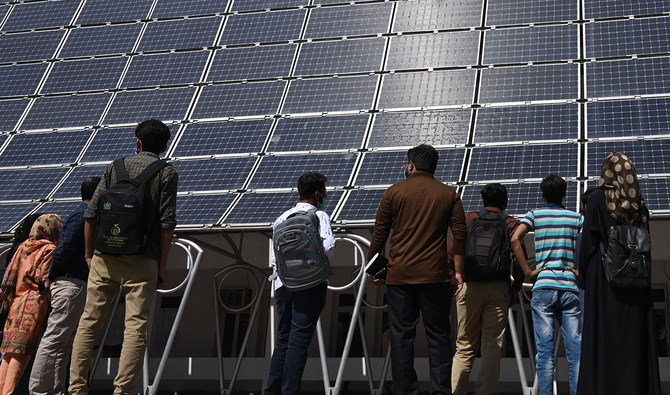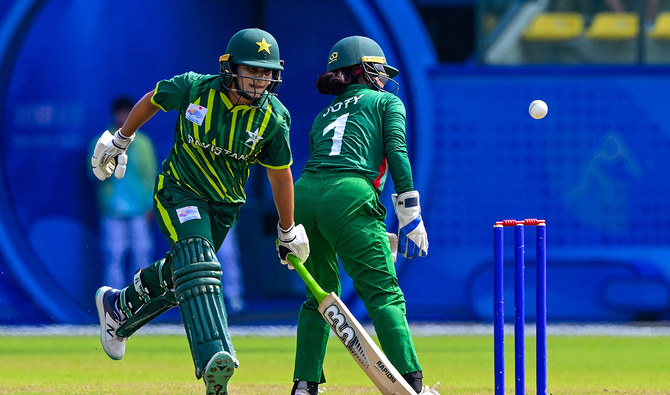ISLAMABAD: A number of Pakistani solar power companies have reported a surge in demand, particularly from affluent households, after July when the government raised electricity prices, but the high costs of setting up solar systems remains an enduring challenge, officials and experts said this week.
Pakistan increased its power tariffs in July as part of reforms agreed under an International Monetary Fund (IMF) loan deal, aiming to reduce unsustainable public debt in its power and gas sectors.
Reforms linked to the bailout, including an easing of import restrictions and a demand that subsidies be removed, have already fueled annual inflation, which rose to a record 38.0 percent in May. Interest rates have also risen, and the rupee hit all-time lows. Last month the currency fell 6.2 percent. To make matters worse, Pakistan last Friday also announced a record rise in petrol and diesel prices, the second big increase in two weeks, while the inflation rate stayed above target at 27.4 percent in August.
In these challenging times, many Pakistanis who can afford it are exploring the option of setting up solar power generation systems in their homes.
“In the last few months, the [electricity] rates have changed around thirty percent and the demand [for solar] has increased to more than sixty to seventy percent,” Ammar Zaheer, a manager for sales development at a leading solar power company, Sky Electric, told Arab News.
Gulsher Khan, a director at Pakistani solar systems provider Alpha Solar, said his company had recorded a 30 percent rise in solar installations in the last two months.
“With this [increasing] cost of electricity ... those who have the investment available, they are getting the systems installed rapidly.”
Pakistan has ideal climatic conditions for solar power generation, with over nine hours of sunlight in most parts of the country. According to the World Bank, utilizing just 0.071 percent of the country’s area for solar photovoltaic (solar PV) power generation would meet Pakistan’s electricity demand. But currently, only 5.4 percent of Pakistan’s installed power generation capacity of 39,772 megawatts comes from renewables like wind, solar and biomass, while fossil fuels still make up 63 percent of the fuel mix, followed by hydropower at 25 percent, according to National Electric Power Regulatory Authority’s (NEPRA) 2021 annual report.
So why is Pakistan unable to tap its solar power potential?
Experts say procedural and bureaucratic delays in construction approvals and unattractive tariffs for selling power to the national grid coupled with a lack of political will and reluctance of government investment are blocking the industry’s progress.
For households, a big impediment is the steep initial investment.
A 5KW solar system, which caters to a family of four, costs around Rs1.2 million ($4,114), while a 10KW solar system for up to six persons can cost up to Rs3 million ($9,836), according to solar system providers. Batteries are expensive and need to be replaced at an extra Rs300,000 every two years or so. Solar panels on the other hand generally have a warranty of 10-15 years and a life of 25 years.
Long term cost saving, however, lies in net metering, which is a billing mechanism that credits solar energy system owners for the electricity they add to the grid. A company registered with the Alternative Energy Development Board (AEDB) will install solar panels on the roof or another sunny place and set up the net metering process on behalf of its customer. If the solar panels generate more electricity than is used, the excess electricity is sold to the national grid.
Pakistan has a total of 767 megawatts net-metered capacity installed, according to the AEDB, which oversees the development of renewable energy sources in the South Asian country. Around 461 megawatts of this were installed in 2022, while the remaining 305 megawatts were added between 2015 to 2021. The AEDB chief did not respond to questions seeking comment for this story.
“The future primarily is to move to solar energy, to renewable energy and I think it gives you a very good cost relief,” said Barrister Shahrukh Iftikhar, a lawyer who was getting solar panels installed on the rooftop of his home on the outskirts of Islamabad last week.
Iftikhar said his family decided to switch to solar energy after his electricity bill increased from the usual Rs50,000 ($171.43) to Rs150,000 ($514.28) a month.
“I think we’ll get economies of scale not in the first couple of years, but then after that it’s as if we won’t be paying for electricity,” Iftikhar said, insisting that the Rs2 million investment was worth it.
“My average electricity bill in summer reduced by over 60 percent after I installed a solar system without batteries,” Imran Mukhtar, an Islamabad resident who installed a 5KW solar system last December, told Arab News.
“We use solar power during the day even to run our air conditioning, but at night we switch to grid electricity.”
Mukhtar said his electricity bill would remain between Rs10,000 ($33.93) in summer, while other four-member families would get around Rs30,000 ($101.78).
Despite the high cost of solar systems as most panels, batteries and other accessories are imported, Ammar, from Sky Electric, said the switch would still benefit consumers by considerably lowering their electricity bills.
“If you are installing a typical system of 10KW, which is the requirement of most houses, you get the return on investment in just three-and-half years,” Zaheer said. “And it will be further reduced if electricity rates keep going up.”
Despite the benefits, including to the environment of zero carbon emissions from solar panels, Pakistan is far behind in meeting its goal of shifting to 60 percent renewable energy by 2030 with 50 percent reduction in projected emissions.
As of 2022, Pakistan’s total solar installed capacity was recorded at 1.24 GW, with an increase of 17 percent compared to 2021, according to Mordor Intelligence, a global market advisory firm. In May 2022, then prime minister Shehbaz Sharif announced removing 17 percent general sales tax on solar panels. In September 2022, the Pakistani government approved the National Solar Energy Initiative to produce 10,000 megawatts (MW) of electricity through solar energy projects, aiming to reduce the import bill of costly diesel and furnace oil.
But Pakistan still gets just five percent of its energy from renewable solutions, while its share of coal in the energy mix has increased significantly over the last five years, said Dr. Imran Khalid, director for governance and policy at the Worldwide Fund-Pakistan.
“The rooftop solar installation is a good thing, but we will have to install big solar and wind power projects to meet the international commitment of renewable energy,” he added.
Aisha Khan, executive director at the Civil Society Coalition for Climate Change networking platform, said the installation of solar panels in Pakistan remained expensive, despite incentives on imports by successive governments.
“We import all the solar panels and their accessories, and they have become costly over the years with sharp devaluation of our currency and increase in freight cost,” Khan said.
“The cost is the biggest hurdle in the solar solution expansion even in urban areas, let alone remote parts of the country.”


















